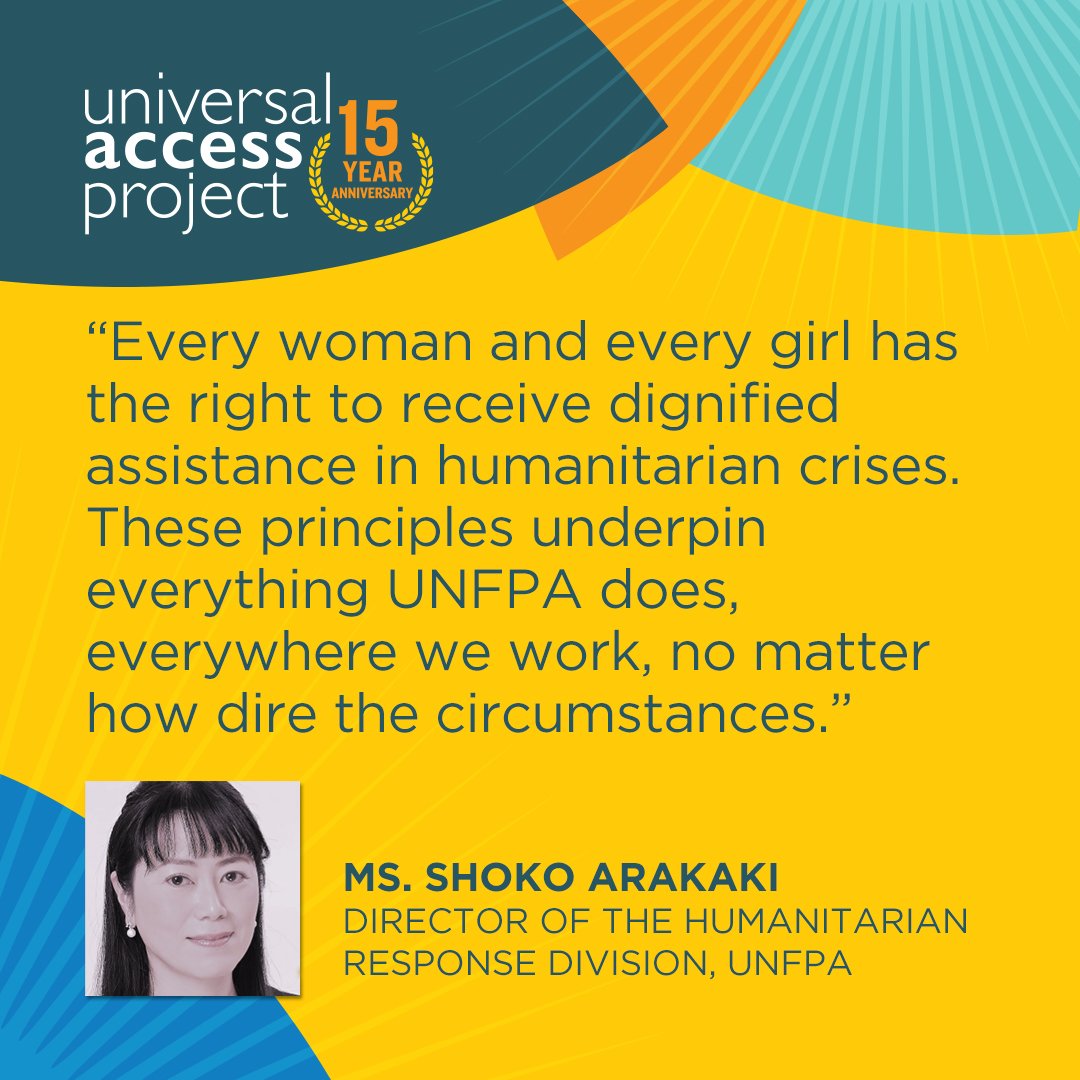A Crisis of Crises: Addressing Sexual and Reproductive Health, Rights and Justice in Humanitarian Contexts
By Dilly Severin, Executive Director, Universal Access Project, in conversation with Ms. Shoko Arakaki, Director of the Humanitarian Response Division, United Nations Population Fund (UNFPA).
The COVID-19 pandemic left in its wake many lessons for the international development community. It was perhaps the first global event that laid bare to the world the gendered impacts of crisis, driving greater recognition of what those of us in the gender equality space have long known: the dual realities that women and girls are both disproportionately impacted by crisis, and are essential to crisis response, recovery, and resilience.
It seems that in the world since the pandemic took hold, we have shifted from a state of “poly crisis” to one of “perma crisis.” Nearly every time I look at the news, I see a headline about a humanitarian crisis. Conflict, war, political upheaval, and natural disasters seem so frequent, and so disastrous, it can feel hard to keep up to date on it all.
An estimated 1.7 million people are displaced in Gaza facing starvation. Escalating conflict in the Democratic Republic of the Congo has displaced nearly 7 million people throughout the country. Political upheaval, underpinned by decades of instability and natural disasters, have displaced more than 35,000 people in Haiti this year alone. And an estimated 8.1 million people have left home in Sudan since conflict erupted in April 2023, including 6.3 million internally displaced people.
These numbers are staggering; and these are just a few of the crises that are making headlines – certainly, there are many more not grabbing the front pages, but equally as devastating.
Crises are a reality. So, too, are the unique sexual and reproductive health and rights needs of women and girls living in humanitarian contexts around the world. People don’t stop having periods, they don’t stop having babies, and they don’t stop having essential health and dignity needs when crisis strikes. Gender-based violence surges, and forced birth and genocide further violate fundamental human rights to bodily autonomy and self-determination.
In this 30th anniversary year of the International Conference on Population and Development (ICPD), which convened the world around the fundamental truth that sexual and reproductive rights are human rights and essential to gender equality and global development, we must ensure the specific needs of women and girls do not fall to the wayside in our crisis response. Although their worlds may be upturned, in many ways, life must go on, and these needs are as fundamental as food, water and shelter.
Humanitarian crises also compound existing inequities, further marginalizing communities that already face barriers to health care access or other social structures due to sex, gender identity, race, ethnicity, religion, ability, or any number of intersecting identities. Crises put essential care even further out of reach; so much so that UNFPA – the UN agency dedicated to sexual and reproductive health and rights – estimates that more than half of all preventable maternal deaths worldwide are occurring in crisis settings. Because of these compounding inequities, humanitarian crises are fundamentally a reproductive justice issue.
As deeply and disproportionately as women are impacted in humanitarian contexts, so, too are they part of the fabric of recovery. Women have unique knowledge and experiences that are essential in helping communities respond and adapt in times of crisis, as well as build resilience for stronger communities in the face of future and protracted crises.
To take a deeper dive in what women and girls are facing in today’s humanitarian crises, and how they and the global community are responding, I spoke to Ms. Shoko Arakaki, Director of the Humanitarian Response Division, United Nations Population Fund (UNFPA):
It does not feel like an exaggeration to say that the world is in a crisis of crises from the Democratic Republic of the Congo to Haiti, to Palestine to Sudan. How is UNFPA responding in these geographies and what do we know about the unique sexual and reproductive health needs and experiences of the women and girls who are living in these contexts and in humanitarian crises more broadly?
UNFPA: No woman should die while giving life or live in fear of gender-based violence. Every woman and every girl has the right to receive dignified assistance in humanitarian crises. These principles underpin everything UNFPA does, everywhere we work, no matter how dire the circumstances.
Indeed, we are seeing conflicts prolong for years, even decades, and an intensifying climate crisis, which is causing record levels of vulnerability and displacement worldwide.
In an emergency, women and girls still get pregnant and menstruate, yet are often cut off from essential reproductive and maternal health services and menstrual hygiene supplies. In Sudan, for example, 65 percent of the population lacks access to basic health care, and in Haiti, less than half of health facilities are still operating as gang violence grips the country.
We’re faced with stark realities: as of May 1st, only four of Gaza’s 36 hospitals remained functional. Women are forced to give birth and care for newborns amid the chaos and insecurity of displacement, conflict and starvation. As one UNFPA-supported doctor recently commented, there are no more normal-sized babies in Gaza due starvation, dehydration and stress among pregnant women. Most women lack skilled support or life-saving maternal health medicines. Surgeries, including c-sections, are being performed without anesthesia. In the town of Rafah in Gaza, we have mobilized midwife networks and delivered life-saving reproductive equipment to maternity wards. In Gaza, Haiti and Sudan we continue to deliver essential medicines, supplies and equipment to hospitals and health facilities, including for the management of obstetric emergencies and the clinical management of rape. We also set up safe spaces for women and girls, ensuring that survivors of violence can get comprehensive medical and psychosocial support.
Crises also bring the insidious and often invisible scourge of gender-based violence. In the Democratic Republic of the Congo, Haiti, Sudan and many other crises women and girls have been subjected to shocking levels of sexual violence at the same time as their social networks and protection systems have folded, increasing their trauma and fear.
In all crises, UNFPA works with and for women and girls, alongside hundreds of non-profit partners and women-led organizations. In the DRC, Haiti and Sudan, mobile clinics and teams are providing reproductive health and services to prevent and respond to gender-based violence to women and girls in some of the hardest-to-reach areas. In Sudan in 2023 our mobile clinics reached close to 100,000 internally displaced people and vulnerable host community members.
What has been successful? What are critical gaps?
UNFPA: UNFPA’s priority is to ensure reproductive health and protection services are still accessible during a crisis - through the deployment of skilled midwives, the provision of life-saving medicines, supplies and equipment, and the establishment of mobile teams and clinics, as well as safe spaces for women and girls.
In Haiti, mobile clinics are delivering antenatal care, including ultrasounds, to pregnant women who have been displaced yet again, providing them with support and reassurance amid the chaos.
UNFPA also distributes essential hygiene items such as soap, shampoo and menstrual supplies to women and girls in crises. Menstruation can add another layer of suffering or shame for women and girls in overcrowded displacement sites which lack privacy and water, and this is often overlooked. As one 14-year-old girl in Gaza said on the receipt of menstrual supplies: “This is the first time anyone has remembered me for anything, especially as a girl.”
How do these crises intersect with, or how are they amplified by, other issues like climate change?
UNFPA: Climate change is a multiplier of existing inequalities and vulnerabilities. Climate-related emergencies trigger displacement and hunger – which in addition to the health risks for pregnant and breastfeeding women, increase the risk for violence, sexual exploitation and abuse and harmful practices. In drought-affected Somali region, there was a 131 per cent increase in child marriage in the first half of 2022 compared to the same period in 2021.
Climate shocks also cause major disruptions in access to health services, including maternal health care, and life-saving medicines, including contraception and maternal health medicines. UNFPA is gathering research and data on the impact of the climate crisis on sexual and reproductive health. In just one example, estimates suggest that approximately 507 women and girls die every day as a result of complications from pregnancy and childbirth in regions affected by conflict, displacement and natural disasters.
We see the disproportionate impacts of the climate emergency on women and girls all over the world. In the South Pacific Region for instance, frequent tropical cyclones are destroying critical infrastructure such as hospitals and schools. Increased stress at homes as livelihoods are impacted is also driving domestic violence against women and girls.
UNFPA’s most recent State of World Population report reflects on the need to address structural inequity to fulfill the promise of the ICPD Programme of Action. In what ways are the challenges of SRHR in humanitarian contexts a reproductive justice issue?
UNFPA: When crises strike, the essentials of reproductive health care—like prenatal services, safe childbirth, and contraception—often become scarce. Reproductive justice delivered through strong institutions and proper rule of law serves as the foundation for good humanitarian work done through a gender lens. Imagine trying to make crucial health decisions without access to trustworthy information or necessary medical services. This harsh reality intensifies in emergencies, where displacement and chaos can also lead to a spike in gender-based violence, impacting survivors' physical and mental health and their control over their reproductive lives. The concept of reproductive justice, which extends beyond health care to include the right to make informed reproductive decisions and live free from violence and discrimination, becomes critically important, especially during times of crisis. While humanitarian assistance helps to quell the urgent short and medium-term needs of the community, long-term structural solutions involve strengthening health and protection services, and adopting policies to ensure inclusive access for all groups, including the most vulnerable.
What can the global community do to support your humanitarian work and the sexual and reproductive health and rights of women and girls in humanitarian contexts?
UNFPA: UNFPA is the lead responder for women and girls in emergencies. They count on us, and we count on the generous support of our donors. We urge the global community to speak up and speak out for women and girls’ rights, and ensure governments underpin global commitments to gender equality with allocated funding.
There are two ways you can help today: Stand up for the rights of women and girls, wherever you are. And if you feel so moved, please consider donating here.
Learn more about UNFPA’s humanitarian work here.

